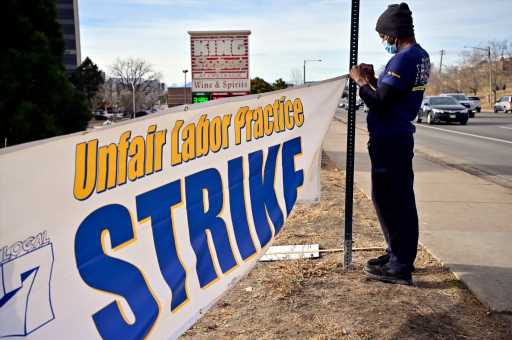As Denver-area King Soopers workers walked the picket lines for a sixth day, negotiators for the union and Colorado’s largest grocery chain met Monday in contract talks that have been marked by each side accusing the other of unfair labor practices and refusing to bargain in good faith.
Heading into the fourth straight day of talks, union representatives said there had been little progress even though they “moved more than 12 offers back and forth” with the company. Company representatives said the Union of Food and Commercial Workers Local 7 hadn’t offered any new proposals on wages, health care or pensions Friday.
The meeting Friday lasted 68 minutes. It was the first bargaining session since Jan. 6 when the union rejected a proposal it described as “riddled with concessions” that King Soopers wants from workers.
“We spent the first day in negotiations listening to corporate executives scream, yell at the members and show utter disdain and disrespect for the workers,” Kim Cordova, union president, said in a video on the UFCW Local 7 Facebook page.
King Soopers spokeswoman Jessica Trowbridge said in an email Monday that the union “continues to choose rhetoric and confusion to distract from their failure to represent their members and allow the company to put more money in their paychecks.”
The company wants the union to let its members vote on the offer turned down by the union’s bargaining committee.
The strike involving more than 8,000 employees at 68 stores in Boulder, Parker and the metro area started Wednesday, a day after the union rejected King Soopers’ “last, best offer.” The proposal included $170 million in wage increases, health care benefits and bonuses ranging from $2,000 to $4,000 upon ratification of the contract.
King Soopers’ contracts with the stores on strike expired Jan. 8. Other contracts with King Soopers and City Market, both owned by Cincinnati-based Kroger, expire later in January and in February.
The UFCW Local 7, which represents 17,000 grocery workers in Colorado and Wyoming, agreed to extend contract talks with Albertsons, which owns Safeway and Albertsons grocery stores.
King Soopers has proposed increasing its starting pay to $16 an hour. The union called the proposal inadequate, saying it’s only 13 cents above Denver’s minimum wage. The union’s offer includes starting pay of $18.56 and the restoration of “hazard” pay that the company gave when the coronavirus pandemic began and ended a couple of months later, in May 2020.
Wages are important to Jay Burnham, a King Soopers employee for nearly 30 years.
“But the main issue right now, the reason we voted to strike, is because of unfair labor practices,” said Burnham, who works at a Glendale store. “They’re bringing people to stock shelves who are not part of the union.”
The UFCW Local 7 filed a lawsuit in federal court in late December that said King Soopers is using third-party staffing services to do union-covered work.
King Soopers filed a complaint with the National Labor Relations Board on Jan. 10 that accuses the union of bargaining in bad faith.
“This is a real test of, not just wills, but market power,” Jeffrey Zax, an economics professor at the University of Colorado in Boulder, said of the strike. “In the pandemic environment, the question of whether either party has an accurate assessment of their relative market power is an interesting one because market power has shifted.”
Worker shortages have given labor more leverage in the market, Zax said. Millions of people haven’t returned to their pre-pandemic jobs or quit because of concerns about COVID-19, lack of child care or the desire to find different work.
“Part of what’s going on here is a test of strength and from the union’s side, the test of strength comes down to how long can its workers hold out,” Zax said.
A report commissioned by four units of the United Food and Commercial Workers Union, including Local 7, said conditions for King Soopers employees had declined over the past 20 years. The report, “Hungry at the Table,” surveyed workers in Colorado, Southern California and the Seattle area and found about three quarters of the respondents reported not having enough food.
“Not too long ago, getting a job at a major supermarket was an entry into the middle class. Most workers worked full-time,” said co-authors Daniel Flaming at the Economic Roundtable, a research firm, and Peter Dreier, a professor at Occidental College in Los Angeles.
That is no longer the case, the report said. “More than two-thirds of Kroger workers struggle for survival due to low wages and part-time work schedules.”
However, an economic study commissioned by Kroger said an analysis of 85,000 employees at its stores in California, Colorado, Oregon, and Washington shows the company’s hourly compensation is higher than that of its peers. The company pays an average of $18.27 per hour and spends an additional $5.61 per hour for health care and retirement, according to the report.
“We provide thousands of people with first jobs (think baggers, cashiers, stockers, etc.), second chances, retirement employment, college gigs, etc. and our longstanding culture of opportunity has created an environment where many come for a job and stay for a career,” King Soopers spokeswoman Trowbridge said in an email.
But Jamal Davis, who has worked for 12 years at King Soopers, said many of his fellow employees have to work two jobs. Davis, who worked for 12 years at Safeway, said he has a second job as a security guard.
“And I do DoorDash at times to make ends meet because I’m a single father,” said Davis, who works in Aurora. “It used to be that you could have a career doing something like this. Nowadays, it’s just a job.”
Source: Read Full Article
